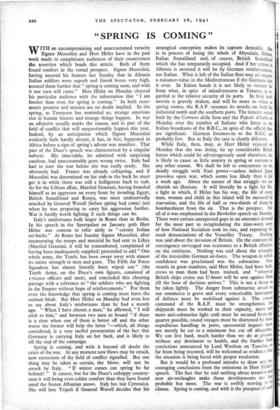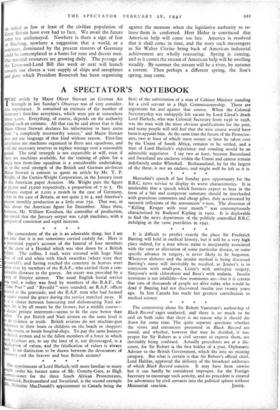" SPRING IS COMING"
WITH an uncompromising and unaccustomed veracity Signor Mussolini and Herr Hitler have in the past week made to complaisant audiences of their countrymen die assertion which heads this article. Both of them found comfort in the vernal prospect. Signor Mussolini, having assured his hearers last Sunday that in Albania Italian soldiers were superb and Greek losses very high, assured them further that " spring is coming soon, and with it our turn will come." Herr Hitler on Monday cheered his particular audience with the information that " I am fresher than ever, for spring is coming." In both state- ments promise and menace are no doubt implied. In the spring, as Tennyson has reminded us, strange emotions rise in human breasts and strange things happen. In war an offensive usually marks the season, and in part of the field of conflict that will unquestionably happen this year. Indeed, by an anticipation which Signor Mussolini evidently feels hardly decent, it has, in fact, happened in Africa before a sign of spring's advent was manifest. That part of the Duce's speech was characterised by a singular naivete. His time-table, he admitted with surprising candour, had unaccountably gone wrong twice. Italy had had to start the war before she was really ready. She obviously had. France was already collapsing, and if Mussolini was determined on his stab in the back he must get it in while there was still a belligerent back to stab. As for the Libyan affair, Marshal Graziani, having branded himself as an aggressor on every front by invading Egypt, British Somaliland and Kenya, was most undeservedly attacked by General Wavell (before spring had come) just when he was preparing to carry his aggression further. War is hardly worth fighting if such things can be.
Italy's misfortunes bulk larger in Rome than in Berlin. In his speech in the Sportpalast on January 3oth Herr Hitler was content to refer airily to " certain Italian set-backs." At Rome last Sunday Signor Mussolini, after enumerating the troops and material he had sent to Libya (Marshal Graziani, it will be remembered, complained of having been inadequately supplied) proceeded to add " One whole army, the Tenth, has been swept away with almost its entire strength in men and guns. The Fifth Air Force Squadron has almost literally been wiped out " (the Tenth Army, on the Duce's own figures, consisted of 170,000 officers and men), and concluded this cheering passage with a reference to " the soldiers who are fighting in the Empire without hope of reinforcements." For them even the knowledge that spring is coming must leave the outlook bleak. But Herr Hitler on Monday had even less to say about Italy's misfortunes than he had a month ago. " When I have chosen a man," he affirmed, " I will stick to him," and between two men so bound " if there is a time when one of them is better off and the other worse the former will help the latter "—which, all things considered, is a very tactful presentation of the fact that Germany is carrying Italy on her back, and is likely to till the end of the campaign.
Spring is coming, and with it beyond all doubt the crisis of the war. At any moment new blows may be struck, new extensions of the field of conflict signalled. But one thing may be taken as certain, the blows will not be struck by Italy. " If winter comes can spring be far behind? " It cannot, but for the Duce's unhappy country- men it will bring even colder comfort than they have found amid the frozen Albanian snows. Italy has lost Cyrenaica. She will lose Tripoli if General Wavell decides that his strategical conception makes its capture desirable. She is in process of losing the whole of Abyssinia, Eritrea, Italian Somaliland and, of course, British Somaliland which she has temporarily occupied. And if her retreat in Albania is arrested it will be by German reinforcements, not Italian. What is left of the Italian fleet may yet acquire a nuisance-value in the Mediterranean if the Germans take it over. In Italian hands it is not likely to venture far from what, in spite of misadventures at Taranto, is re- garded as the relative security of its ports. In Italy itself morale is gravely shaken, and will be more so when, as spring comes, the R.A.F. resumes its attacks on both the industrial north and the southern ports. The laments voiced both by the Corriere della Sera and the Popolo d'Italia on Monday over the number of Italians who listen to the Italian broadcasts of the B.B.C., in spite of the official ban, are significant. German listeners-in to the B.B.C. are probably few. But in Italy the case is clearly different.
While Italy, then, may, as Herr Hitler rejoiced on Monday that she was doing, tie up considerable British forces which could be advantageously used elsewhere, she is likely to cause us little anxiety in spring or summer or any other season. We shall be left to concentrate on the deadly struggle with Nazi power—unless indeed Japan provokes open war, which seems less likely than it did a week ago. About the nature of that struggle we can cherish no illusions. It will literally be a fight for life, a fight in which, if Hitler has his way, the life of every man, woman and child in this island will be menaced by starvation, and the life of half or two-thirds of them by bombardment from the air. That is the prospect. Not all of it was emphasised in the Bierkeller speech on Monday. There were certain unexpected gaps in an utterance devoted for the most part to recapitulating the time-worn story of how National Socialism took its rise, and repeating the stock denunciations of the Versailles Treaty. Nothing was said about the invasion of Britain. On the contrary the contingency envisaged was resistance to a British offensive on the continent. Nothing was said about the triumphs of the irresistible German air-force. The weapon in which confidence was proclaimed was the submarine. New vessels in great numbers, said Herr Hitler, had been built, crews to man them had been trained, and " wherever British ships cruise our U-boats will be sent against them till the hour of decision arrives." This is not a threat to be taken lightly. The danger from submarine attack 00 our commerce is grave and every conceivable instrument of defence must be mobilised against it. The coastal command of the R.A.F. must be strengthened, the shipyards must be worked to their capacity, more and more anti-submarine light craft must be secured from any quarter possible, round voyages must be shortened by more expeditious handling in ports, upessential imports must not merely be cut to a minimum but cut off altogether. We can live hard, much harder than we do at present, without any detriment to health, and the further food restrictions announced by Lord Woolton on Tuesday, 5° far from being resented, will be welcomed as evidence that the situation is being faced with proper resolution.
But it would be a profound mistake to draw any ell" couraging conclusions from the omissions in Herr Hitler: speech. The fact that he said nothing about invasion and new air-onslaughts make those developments not less i probable but more. The war is swiftly moving to it' climax. Spring is coming, and with it the prospect of such an ordeal as few at least of the civilian population of Great Britain have ever had to face. We await the future sober but undismayed. Nowhere is there a sign of fear or flinching, nowhere a suggestion that a world, or a continent, dominated by the present masters of Germany could be contemplated as a home for sane and decent men. Our material resources are growing daily. The passage of the Lease-and-Lend Bill this week or next will launch towards our shores a vast supply of ships and aeroplanes and guns which President Roosevelt has been organising against the moment when the legislative authority to re- lease them is conferred. Herr Hitler is convinced that American help will come too late. America is resolved that it shall come in time, and the story such messengers as Sir Walter Citrine bring back of American industrial achievement are wholly reassuring. Spring is coming, and as it comes the stream of American help will be swelling steadily. By summer the stream will be a river, by autumn a torrent. Then perhaps a different spring, the lion's spring, may come.



























 Previous page
Previous page